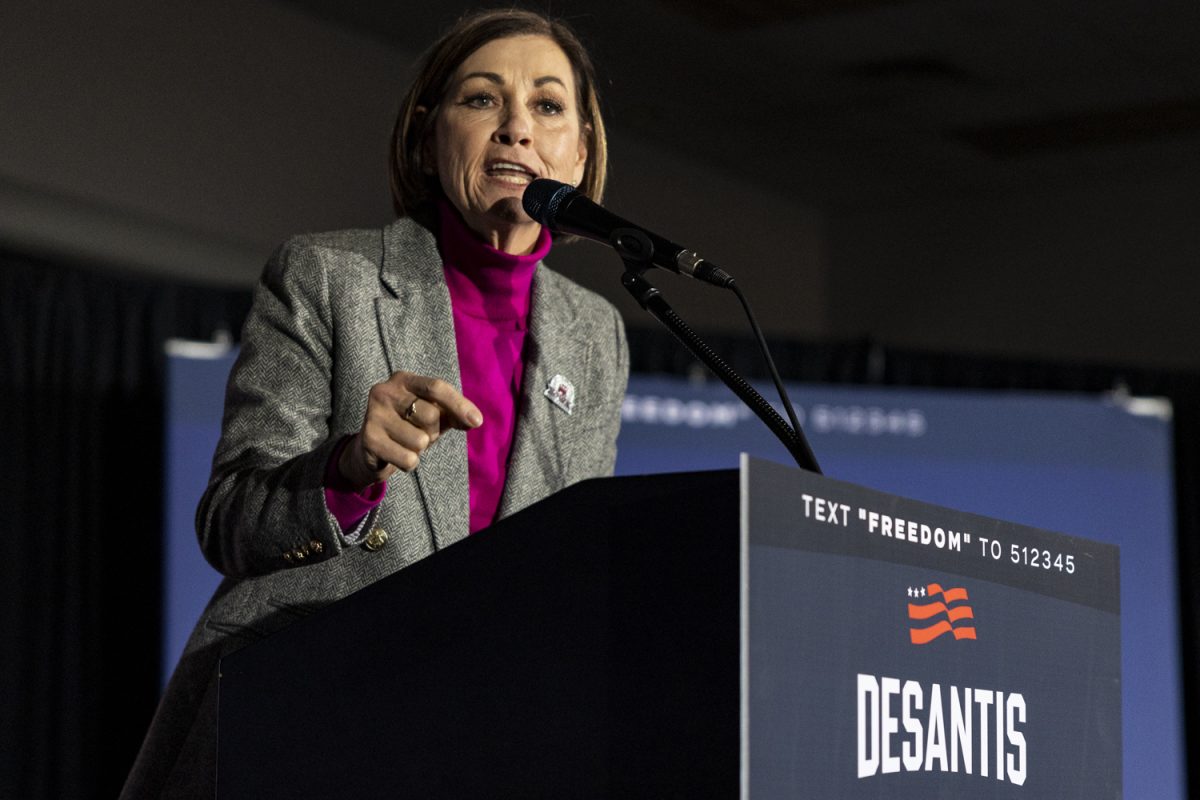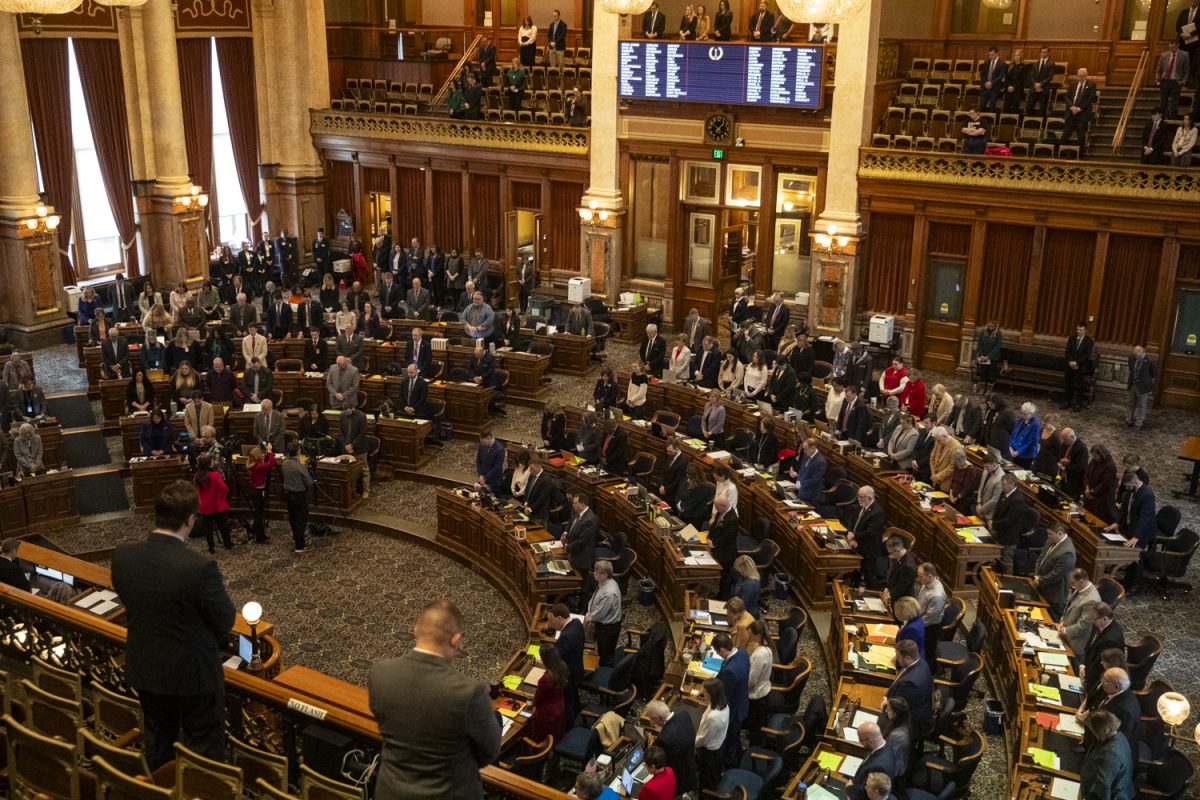While millions of people gathered in the streets of cities around the country and world to speak out against the new administration in Washington, others participated in a form of protesting of their own — refusing to attend a Women’s March or expressing a lack of support for the event in the first place.
For some, the problems came with the anti-President Trump rhetoric or confusion over which issue was being fought. Others viewed the protests as yet another way to exclude marginalized groups.
“Other than hating Donald Trump, there doesn’t seem to be a unifying message behind that,” Will Rogers, the previous chairman of the Republican Party of Polk County, said about the Women’s March.
Rogers, who attended the sister march in Des Moines, said although it was peaceful, there were too many individual protests happening all at once.
The message wasn’t clear, he said, which has been a criticism from others in the days following the marches.
While Rogers said the lack of a single message was a downfall of the march, Rep. Dave Loebsack, D-Iowa, said he thought this was a reason to mark the event as successful.
“I think that was the purpose,” he said following the march.“I think there are so many different facets of Americans’ lives that are going to be touched by Trump and the Republican Congress.
“Yes, it was primarily a women’s march, but it wasn’t just that.”
But that message of inclusion didn’t register with everyone.
“I don’t know why it has to be women versus men; we should all be together, which is how God made us, so I want to heal those divisions, and this sounds like it is exacerbating them,” Rep. Steve King, R-Iowa told The Daily Iowan before the Jan. 21 march.
However, King noted he believed marches or events similar to this can be effective in other ways.
“And if they stimulate conversations about the protection of human life, then it’s a good thing,” he said. “The marches make results beyond sending messages; they cause a discussion, help recruit volunteers, fund organizations, and contribute to the competing marketplace of ideas that we have in this country.”
In fact, over the course of history, this has in some cases proved to be true.
On the day of the Women’s March, the New York Times published an article detailing successful marches that had taken place in Washington. The 1913 Women’s Suffrage Procession, which eventually led to women’s right to vote, and the March on Washington for Jobs and Freedom in 1963, in which Martin Luther King Jr. gave his famous “I Have a Dream” speech, were both listed.
Protests similar to these have been happening for generations, and to some, that is a reason to be disappointed in the Women’s March frenzy.
“I went to the one in Des Moines, and if we’re being real here, I was unimpressed,” University of Iowa senior Sara Lettieri said. “It’s been happening for forever, it’s been happening to more than just white women. I don’t know where they’ve been this whole time.”
Lettieri described a scene of calm protest in which people held simple signs and walked on the sidewalks for a few blocks around the State Capitol.
To make any kind of change, she said, things need to be more radical — protesters need to walk in the streets, stopping traffic.
“People walk on sidewalks every day — that’s where you’re supposed to walk,” she said. “I was just frustrated because I, myself, like my protests more radical.
“I felt like Des Moines was just riding off the fact that it was happening everywhere else … Had this not been riding off of every other women’s march, it wouldn’t have even made it into the news.”
Lettieri also said she had a problem with what she perceived as a lack of diversity. This wasn’t a problem at only the Des Moines march but rather something that is inherently a problem at all events like this.
“I was thinking, why is this so white?” she said. “[White women are] not mad all the time; otherwise, they would have been at the other rallies.
“They don’t show up until it affects them, unless it affects their uteruses.”
Rachel Zuckerman, the UI Student Government president, said the lack of inclusiveness is the reason she was hesitant before deciding to make the trip to D.C.
“My biggest concern going into the march was realizing there was controversy over whether or not it was truly an inclusive movement,” she told the DI, noting the original name of the protest, the Million Women March.
The name was quite similar to that of a 1997 protest arguing for the rights of black women.
“Organizers quickly changed the name of the protest to the Women’s March on Washington, but many remained frustrated thinking that this was yet another example of white feminists appropriating black activism,” Zuckerman wrote in an email. “I was a happy to see that organizers of the protest worked hard to make the event incredibly conscious of intersectionality.”
The “white feminist phenomenon” is the reason Kenya Lewis, a recent UI graduate, had trouble supporting the movement. Lewis said she believed the march did not support or advocate for the well-being of black women.
“These same issues that white women are marching for today will still be very real for black and brown women tomorrow,” she wrote in an email. “If critical reflections and conversations are not had, what was the true purpose of it?”
In the end, a march — even if it does draw crowds in the millions across the globe — means nothing to Lewis without tangible action — the right kind of tangible action, she said.
“I rather trust an ally’s actions than a popular sign and a pussy hat that, in the end, is a cover up of empty promises by white women,” she said.
Even though the multi-city event was lauded by many for working toward the inclusion, recognition, and advocacy of all marginalized groups, Lettieri believed it was still geared too much toward white women.
“I don’t expect any fundamental change,” she said. “I expect some people will listen to some white ladies.”
Linn County Republican head Cindy Golding also said she noticed the privilege, and possibly lack of knowledge, from some women who attended at the D.C. march.
“I spoke with an attorney and a law professor, another who was a teacher, and another who was an admin[istrator] of some sort … and I asked what their purpose was, and they all said women’s rights. Then I asked specifcally what rights, and no one could tell me,” she told the DI. “This is women wanting things handed to them instead of being willing to work for them.
“As a woman business owner and as someone who has taught my daughters to be independently successful, I think this march was a crock of crybabies.”
Despite disagreements over the purpose or success of these women’s marches, Sen. Chuck Grassley, R-Iowa, said it is important for Americans to realize that there are more ways to effect change.
“While there are still many countries where taking to the streets is the only way for citizens to make their voice heard, we are lucky to live in a country where there are many opportunities for Americans to engage with each other and their government,” he said in a prepared statement to the DI.
Sen. Joni Ernst, R-Iowa, issued a similar statement, saying that while protesting and freely expressing ones’ views is an important part of being an American, it is also time to look ahead.
“I also think it’s important that in the days and month ahead, we look for areas where we can come together and work on solutions to the important issues our country faces,” she said in a statement to the DI.
This is also the way Rogers looks at a post-march future.
“Look, the fact of the matter is Donald Trump has motivated these people, and this is the way they respond,” he said. “Whether people like it or not, he’s going to be the president for the next four years.”







